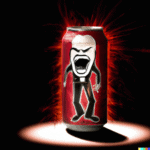The movie Heavy Metal was an animated science fiction fantasy film released in 1981. The film was adapted from the magazine Heavy Metal and centered around a collection of stories with a theme of an evil force. Although the film received mixed reviews from critics and was only a moderate success at the box office, it has since seen extended life as a cult movie. One of the best things about the film is the music. The accompanying soundtrack was an interesting combination of heavy metal artists such as Black Sabbath and non-heavy metal acts such as Stevie Nicks. The soundtrack also featured major artists of the time (Cheap Trick) and obscure bands (Riggs). The album, released in July 1981, was a commercially successful record peaking at number 12 on the Billboard 200. Below is a list of the bands that were featured on the film’s accompanying soundtrack.
Sammy Hagar (“Heavy Metal”) – Sammy in his pre-Van Halen days was an obvious choice to belt out the title track for the movie. The song is an all-out rocker that fits perfectly with the name Heavy Metal. At the time of the release of the soundtrack, Hagar was still building a solo career following notoriety as the lead singer of 70’s hard rock band Montrose best known for “Bad Motor Scooter.” In 1981, Hagar was coming off his most successful solo record – 1980’s Danger Zone -which peaked at number 28 on the Billboard 200. The release of “Heavy Metal” predated his commercial breakthrough of the single “Your Love is Driving Me Crazy” by one year and four years prior to joining Van Halen. Although “Heavy Metal” did not hit the Top 40, it solidified his reputation with the rock crowd and became a fan favorite.
Riggs (“Heartbeat” and “Radar Rider”) – Riggs, led by guitarist Jerry Riggs, holds the distinction of being the most obscure band (then and now) included on the soundtrack while also being one of only three artists (Cheap Trick and Don Felder being the others) to have multiple songs on the soundtrack. Although both songs fit nicely in the overall theme of heavy songs, the band was never able to capitalize on the exposure of inclusion on the soundtrack. Riggs released an album following Heavy Metal , which did not have much commercial success. Jerry Riggs would join Pat Travers in 1983 where he would spend the next ten years as co-lead guitarist with Travers. Jerry would jump back in the rock limelight in 2019 as a touring member of .38 Special where he continues today.
Devo (“Working in the Coal Mine”) – Given the first two songs on the soundtrack, Devo’s cover of the Lee Dorsey classic from 1966 – which hit number 8 on the Billboard Hot 100 and UK Singles Chart – was a surprise. The song was written by legendary producer and performer Allen Toussaint. The version Devo recorded was far different than the original version but despite its quirky sound, it came close to hitting the Top 40 in the US – landing at number 43. Devo originally released the song as a bonus 7-inch single for their 1981 album New Traditionalists. While Devo only had one song featured on the soundtrack album, their song “Through Being Cool” was also featured in the film. A year prior to Heavy Metal, Devo was riding high on the commercial side with the hit single “Whip It” which peaked at number 14 on the Billboard Hot 100. This would be their only Top 40 hit in a career full of notable songs.
Blue Oyster Cult (“Veteran of the Psychic Wars”) – Of all the bands included on this soundtrack that combines sci-fi and hard rock, perhaps no band at the time was more appropriate than Blue Oyster Cult. They were already an established band on the hard rock circuit by the time they were included on the Heavy Metal soundtrack with eight studio albums under their belt, a Top 10 single in “(Don’t Fear the Reaper” and cult classics such as “Godzilla” and “In Thee.” The track “Veteran of the Psychic Wars” from their 1981 hit album Fire of Unknown Origin will never be mistaken for a Top 40 hit but nonetheless is classic BOC. The album included another big hit however in “Burnin’ for You” which would hit the Top 40 in the US and become one of their most well-known songs.
Cheap Trick (“Reach Out” and “I Must Be Dreamin'”) – One of the three artists to have two songs included on the album, Cheap Trick were already a famous band by the time of Heavy Metal having already released five studio albums including the commercially successful Dream Police and the massive selling live album Cheap Trick At Budokan – widely considered one of the best live albums in rock history. In 1981, Cheap Trick were winding down in terms of their commercial success which included a Top 10 hit with “I Want You to Want Me” and three other Top 40 singles. However, they were still an internationally famous rock band with some momentum on their side. “Reach Out” was released as a single for the Heavy Metal soundtrack and “I Must Be Dreamin'” was the b-side for the release. The song failed to achieve commercial success. The next few years would be tough commercially for Cheap Trick with a few albums that did not sell to the standards of their 70’s heyday. However, in 1988, Cheap Trick would get back on top of the rock world with the release of their Lap of Luxury album that included two Top 5 hits in the US with “The Flame” hitting number 1 and “Don’t Be Cruel” going to number 4.
Don Felder (Heavy Metal (Takin’ A Ride)” and All of You”) – Like Cheap Trick and Riggs, Felder had two songs included on the album. Felder, best known as the guitarist of the Eagles during their prime, wrote Heavy Metal (Takin’ A Ride)” for the album and included his bandmates Timothy B. Schmit and Don Henley on backing vocals. The song is arguably the most recognizable song on the album and is exactly what you would expect from the guitar legend that also wrote “Victim of Love,” “Hotel California” and “Those Shoes.” The song sounds like a revved-up version of late 70’s Eagles with outstanding guitar and vocals. Although the song was only a moderate hit on the Billboard Hot 100 (reaching number 43), it was a big hit on rock radio peaking at number 5 on US Billboard Top Tracks which ranked the top played songs on rock radio. Felder’s other contribution to the album was the b-side of “Heavy Metal (Takin’ A Ride)” called “All of You” which was a slower paced but still burner of a song. Felder would continue to record as a solo artist and also contribute a song to another soundtrack the following year with “Never Surrender” (co-written by Kenny Loggins) from the Fast Times at Ridgemont High soundtrack.
Donald Fagen (“True Companion”) – Fagen will always be best known as one half of the core of Steely Dan but also recorded some great songs as a solo artist. The song “True Companion” was at that point an unreleased track by Fagen and predates his first solo album – 1982’s The Nightfly – by a year. The track is classic Fagen / Steely Dan with a cool, jazzy sound and some stellar guitar. The track would not make it on The Nightfly album the following year but was included as a bonus track on The Nightfly Trilogy boxed set.
Nazareth (“Crazy (A Suitable Case for Treatment) – By the time Heavy Metal was released, Scottish hard rockers Nazareth had issued their 12th album – The Fool Circle. Seven years earlier, the band hit it big in the US with their single “Love Hurts” off the successful Hair of the Dog album. While the single was a Top 10 hit in America, it missed hitting the Top 40 in the UK. Despite the lack of success for “Love Hurts” in the UK, Nazareth delivered six Top 40 hits in the UK by the end of the 1970’s – including two Top 10 UK hits with “Broken Down Angel” and Bad, Bad Boy” (both in 1973). And although “Love Hurts” was their only Top 40 song in the US, Nazareth hit the Billboard Top 100 album charts seven consecutive times from 1975 – 1981 – including the Platinum selling Hair of the Dog. For the Heavy Metal soundtrack, the band contributed “Crazy” which serves as a good example of the hard boogie blues that Nazareth belted out on a consistent basis.
Journey (“Open Arms”) – Journey’s ballad “Open Arms” is an interesting selection for this soundtrack considering most of the songs were of the heavier variety. The song was originally conceived by keyboardist Jonathan Cain while he was still a member of The Babys. The song was rejected by the band and was ultimately brought to Journey when he joined the band. Lead singer Steve Perry helped refine the song for inclusion on the band’s 1981 release Escape – the band’s highest charting album that eventually went to number one in the US. The song was included on the Heavy Metal soundtrack and played in the movie prior to its release as a single in 1982. Like the album Escape, “Open Arms” was the band’s biggest hit and represented the only number one single for Journey.
Grand Funk Railroad (“Queen Bee”) – Enjoying a streak of eight consecutive Top 10 US albums from 1970-1974 and four Top 5 hits on the Billboard charts including “We’re An American Band,” “Loco-Motion” and “Some Kind of Wonderful,” Grand Funk Railroad were mega stars in the US in the 1970’s. However, by the mid 1970’s the band started losing momentum and ultimately disbanded in 1976. Their return as a recording act was marked by the 1981 album Grand Funk Lives. The album failed to make a mark commercially. “Queen Bee” was included on the Grand Funk Lives album as well as the Heavy Metal soundtrack. Grand Funk Railroad would release one more album in 1983 before calling it quits as a recording band. Various versions of the band have continued to tour through the years but unfortunately have not released a studio album since 1983.
Black Sabbath (“Mob Rules”) – If there was a prototypical band to have a song on an album titled Heavy Metal, it was Black Sabbath. The band achieved huge success during the 1970’s with lead singer Ozzy Osbourne, guitarist Tony Iommi, bassist Geezer Butler and drummer Bill Ward. 1978 marked the last year the band recorded with Ozzy. In 1980, Black Sabbath re-emerged with new lead singer Ronnie James Dio fresh off his successful run with Rainbow. His first album with the band – Heaven and Hell – was a step in the right direction after a few commercially disappointing albums towards the end of the 1970’s. Black Sabbath returned to the studio to release the well-received Mob Rules album in late 1981. The title track was included on the Heavy Metal soundtrack and fits in perfectly with the movie and album. “Mob Rule” is classic Black Sabbath with trademark guitar from Iommi and Dio’s vocals. “E5150” was also featured in the movie but was not included on the soundtrack.
Trust (“Prefabricated”) – Similar to Riggs, Trust was an obscure for the Heavy Metal soundtrack. The French band achieved popularity in Europe in the early 80’s releasing some of their albums in their native French as well as English lyric versions. The band would go through multiple drummers early in the career including Nicko McBrain on Savage just prior to joining Iron Maiden (where he is still the drummer today) and Clive Burr on later albums after he left Iron Maiden. The year before Heavy Metal, Trust released their most popular song “Anitsocial” on their album Repression. The song is best known in the US from the cover version Anthrax released in 1988 on State of Euphoria. For the Heavy Metal album, the song “Prefabricated” was selected. Originally released in French on 1979’s Prefabriques, the song was converted to English for the version that would ultimately land on Heavy Metal. The track fits perfectly beside “Mob Rules” and other heavier songs on the soundtrack. Trust never cashed in on the US market following their exposure from Heavy Metal.
Stevie Nicks (“Blue Lamp”) – Perhaps the most unusual artist choice on Heavy Metal is Stevie Nicks. Already an international star for her work in Fleetwood Mac, Nicks was beginning to build her solo career and would release her first solo album – Bella Donna – later in 1981. “Blue Lamp” was recorded during the sessions for Bella Donna but was shelved for the release and instead included on Heavy Metal. While Nicks might not have been a logical choice for Heavy Metal, “Blue Lamp” holds up well on the soundtrack. Nicks would return to soundtracks the following year with “Sleeping Angel” for the Fast Times at Ridgemont High soundtrack.













